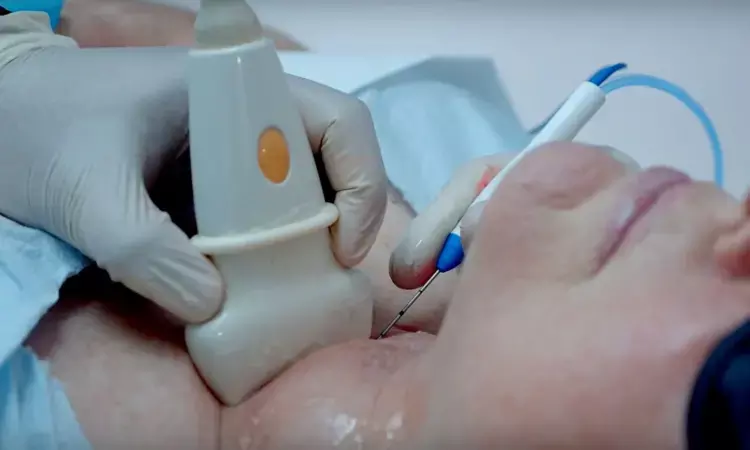- Home
- Medical news & Guidelines
- Anesthesiology
- Cardiology and CTVS
- Critical Care
- Dentistry
- Dermatology
- Diabetes and Endocrinology
- ENT
- Gastroenterology
- Medicine
- Nephrology
- Neurology
- Obstretics-Gynaecology
- Oncology
- Ophthalmology
- Orthopaedics
- Pediatrics-Neonatology
- Psychiatry
- Pulmonology
- Radiology
- Surgery
- Urology
- Laboratory Medicine
- Diet
- Nursing
- Paramedical
- Physiotherapy
- Health news
- Fact Check
- Bone Health Fact Check
- Brain Health Fact Check
- Cancer Related Fact Check
- Child Care Fact Check
- Dental and oral health fact check
- Diabetes and metabolic health fact check
- Diet and Nutrition Fact Check
- Eye and ENT Care Fact Check
- Fitness fact check
- Gut health fact check
- Heart health fact check
- Kidney health fact check
- Medical education fact check
- Men's health fact check
- Respiratory fact check
- Skin and hair care fact check
- Vaccine and Immunization fact check
- Women's health fact check
- AYUSH
- State News
- Andaman and Nicobar Islands
- Andhra Pradesh
- Arunachal Pradesh
- Assam
- Bihar
- Chandigarh
- Chattisgarh
- Dadra and Nagar Haveli
- Daman and Diu
- Delhi
- Goa
- Gujarat
- Haryana
- Himachal Pradesh
- Jammu & Kashmir
- Jharkhand
- Karnataka
- Kerala
- Ladakh
- Lakshadweep
- Madhya Pradesh
- Maharashtra
- Manipur
- Meghalaya
- Mizoram
- Nagaland
- Odisha
- Puducherry
- Punjab
- Rajasthan
- Sikkim
- Tamil Nadu
- Telangana
- Tripura
- Uttar Pradesh
- Uttrakhand
- West Bengal
- Medical Education
- Industry
Microwave ablation feasible for treating papillary thyroid microcarcinoma

China: Microwave ablation effectively treats papillary thyroid microcarcinoma with ultrasound-detected capsular invasion, a recent study published in the Radiology journal has found.
The study further revealed that microwave ablation (MWA) showed comparable short-term efficacy with or without capsular invasion presence. Capsular invasion detection using ultrasound is typically avoided due to safety concerns. The authors explain, "our findings suggest that the treatment outcomes of microwave ablation on papillary thyroid microcarcinoma were similar whether or not the disease included capsular invasion."
The authors state that most detected papillary thyroid microcarcinomas have a low risk and a favourable prognosis. The current guidelines, however, recommend active surveillance or surgical resection for these cases. Previous studies have shown microwave ablation, a minimally invasive method, promising for treating such carcinomas. Its use for treating papillary thyroid microcarcinomas with aggressive features remains debatable.
Previously, the capsular invasion has been identified as an independent risk factor for thyroid lymph node metastasis. However, due to concerns about increasing post-treatment complications, papillary thyroid microcarcinomas with ultrasound-detected capsular invasion have been excluded from thermal ablation treatment.
Against the above background, Lin Zheng, People's Liberation Army General Hospital in Beijing, China, and colleagues aimed to compare the feasibility, safety and effectiveness of MWA in treating papillary thyroid microcarcinoma (PTMC) with and without US-detected capsular invasion in a prospective study between 2019 to 2021.
For this purpose, the researchers enrolled participants from 12 hospitals with a PTMC maximal diameter of 1 cm or less without ultrasound or CT-detected lymph node metastasis (LNM) who planned to undergo microwave ablation. The preoperative ultrasound evaluated the tumours; they were categorized into those with and those without capsular invasion. The participants were under observation until July 1, 2022.
The primary endpoints were disease progression and technical success. Secondary endpoints included tumour shrinkage, treatment parameters, and complications, which were compared between the two groups.
The study led to the following findings:
· After exclusion, 461 participants (mean age, 43 years; 337 women) were included: 83 with and 378 without capsular invasion.
· After one participant with capsular invasion aborted MWA because of technical failure, 82 participants with and 378 without capsular invasion (mean tumour volume, 0.1 mL ± 0.1 vs 0.1 mL ± 0.1) were analyzed with a mean follow-up period of 20 months and 21 months, respectively.
· In those with and those without capsular invasion, comparable technical success rates were achieved (99% vs 100%), with one and 11 complications, respectively (1% vs 3%).
· There was no evidence of differences in disease progression (2% vs 1%) or tumour shrinkage (97% vs 96%).
The researchers conclude, "microwave ablation was feasible in treating papillary thyroid microcarcinoma with ultrasound detected capsular invasion and showed comparable short-term efficacy with or without capsular invasion."
Reference:
The study "Microwave Ablation for Papillary Thyroid Microcarcinoma with and without US-detected Capsule Invasion: A Multicenter Prospective Cohort Study" was published in Radiology.
DOI: https://doi.org/10.1148/radiol.220661
Dr Kamal Kant Kohli-MBBS, DTCD- a chest specialist with more than 30 years of practice and a flair for writing clinical articles, Dr Kamal Kant Kohli joined Medical Dialogues as a Chief Editor of Medical News. Besides writing articles, as an editor, he proofreads and verifies all the medical content published on Medical Dialogues including those coming from journals, studies,medical conferences,guidelines etc. Email: drkohli@medicaldialogues.in. Contact no. 011-43720751


